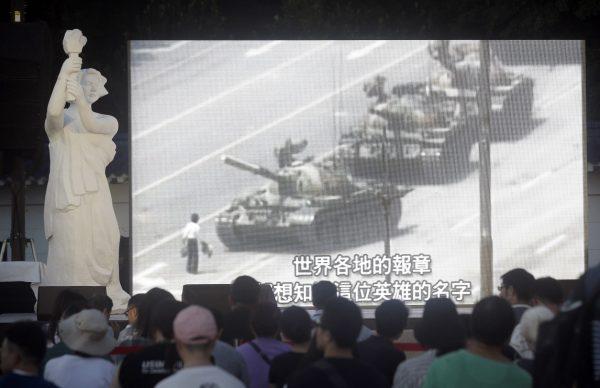BEIJING—This story was first published on June 6, 1989, three days after China began a bloody crackdown on pro-democracy protesters in Beijing’s Tiananmen Square. The AP is republishing the story for the 30th anniversary of the violence in which hundreds, if not thousands, of people are believed to have died.
Foreign journalists covering the martial law crackdown in China have been shot, beaten and detained by troops in an attempt to quell coverage of one of the darkest pages in communist China’s history.
A Japanese reporter was shot in the foot and a French journalist was hit by a bullet in the back while both were mingling with crowds near Tiananmen Square. Both are recovering.
Two American television reporters were roughed up and detained for a day. A reporter for the British wire service, Reuters, was blindfolded and held for six hours. Troops beat two other British reporters.
Another British journalist was forced to kneel in front of troops who beat him with sticks. A Chinese propaganda team took photographs of the incident and one member ripped off the journalist’s glasses and crushed them.
At least six photojournalists have had their equipment confiscated or smashed on the pavement by troops.
Most of the incidents occurred Saturday and early Sunday when many reporters were on the streets, covering the bloodshed that left hundreds, perhaps thousands, of unarmed Chinese dead. By Sunday night, many reporters had confined themselves to hotels.
Those who did venture out found a city under siege. Traveling was done best by bicycle, through the cramped back alleys of the inner city.

On Monday and Tuesday, troops occupied main intersections but during the day let pedestrians and cyclists pass. Troops at one intersection scrambled to the top of a tank when an Associated Press reporter pedaled by, but they did not attempt to stop him.
Foreign reporters have been welcomed by the citizens of Beijing, who universally oppose the army’s occupation of their city.
“Let the world know about what is happening to us,” said one woman as troops sprayed automatic weapons fire at crowd of demonstrators. “Let the whole world know that our government has gone mad.”
Reliable information is hard to come by.
The Chinese media is in the hands of those who turned the troops on the people. State-run radio on Monday claimed that “not one person died on Tiananmen Square.”
The Chinese Red Cross refuses to answer questions on the death toll and hospitals rarely have complete statistics.
On the street, Chinese surround foreign reporters, asking them for any information about what is happening in their city.
“We have no other choice,” said one man, standing near a burning bus. “Our media is run by bandits. News about our own country has become another import item.”
When martial law was declared on May 20, the city government slapped tight restrictions on the foreign media, prohibiting coverage of the activities of Chinese troops.
But the foreign media, in town by the hundreds for the summit with Soviet President Mikhail S. Gorbachev, ignored the restrictions.
The restrictions were expanded last week when foreign reporters were prohibited from talking with Chinese about martial law, but the new rules also were generally ignored.
During the army’s siege of Tiananmen Square, a CBS News correspondent and his cameraman were grabbed by troops during a live broadcast.
Reporter Richard Roth and cameraman Derek Williams were roughed up by six to eight soldiers, who kicked and punched them. They were detained for about 20 hours.
Michael Fathers, a correspondent for the British newspaper Independent, said he was beaten by a paramilitary “goon squad” near Tiananmen Square on Sunday as troops poured into the plaza.
“They just charged at me like madmen,” Fathers said. “One man pointed his pistol at my head and told me to put my hands up. The others whacked me with sticks and did karate jumps, banging into me.”
“Soldiers nearby broke ranks and ran over, kicking and thumping me. They were just crazy. A propaganda team showed up, taking pictures. One of them took my spectacles and crushed them into the pavement in some kind of symbolic act. They made me kneel with my hands in the air and just kept whacking me.”
Covered in bruises and lacerations, Fathers collapsed. An officer stopped the beating. After detaining him for two hours, the troops let him go.
“I went up a side street. When the citizens saw me coming they applauded. They treated me like a bloody hero.”





